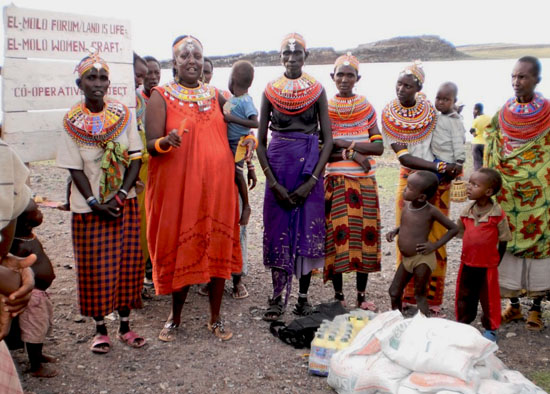Last year East Africa suffered the worst drought in six decades.
Significant rainfall hadn’t come to eastern Kenya for more than two years. Farmers had no crops and herders could not keep their livestock alive.

The La Niña weather patterns that caused the drought have an uncertain connection to climate change. But the all-around hotter and drier conditions in the region, a trend of our changing climate, had reduced farmers’ resiliency. Heavy deforestation has also reduced the environment’s ability to produce moisture and retain water.
Amidst the crisis, the international community and large aid organizations stalled in providing much-needed help to the 11 million people at risk of malnutrition and famine. Meanwhile, grassroots organizations and leaders mobilized to provide relief and support local solutions to adapt to the situation.
Grassroots Action on the Banks of Lake Turkana
Christina Saiti Louwa has lived along Lake Turkana in northern Kenya all her life. She is a member of the El Molo tribe and Director of The El Molo Forum, an organization that advocates for climate justice and the rights of the El Molo people. For years, her organization has worked to strengthen community participation and promote gender equality and women’s rights.

Christina is also a member of Kenya’s delegation to the United Nations climate change discussions, where she lobbies to include indigenous perspectives in high-level talks. Climate change is a visible phenomenon for the El Molo people and others who live around Lake Turkana: the lake has receded about 5-8 meters in recent years.
When the famine overtook surrounding communities, Christina and The El Molo Forum took action. They set out to raise awareness about climate change and develop solutions to cope with the drought—both immediate and long-term solutions that would mitigate the impact of future dry spells.

Workshops, Food Aid, and Reviving the Environment
The El Molo Forum used $5,000 from Global Greengrants Fund to host workshops with other local women’s groups about climate change, drought preparedness and mitigation, and alternative livelihoods. The group then used a land cruiser to bring food and clothing to the worst affected drought victims in Loiyangalani District, Northern Kenya, where three-quarters of livestock had died. With these funds, the organization reached 400 households with packages of cornmeal, flour, rice, and oil.
To begin regenerating the local environment, The El Molo Forum supplied tree seedlings to communities and educated members on how to plant and care for the trees. Along with the workshop on climate change and the immediate food aid, the actions of this grassroots organization had a positive impact on local people during a difficult time.
After the project, Christina wrote of the experience:
“We are reaching out and trying to influence community elders, as they are the major decision-makers; women, as they are the homemakers who provide food, firewood, water, and build homes for their families and communities; and finally, the youth, as they are our future and future decision-makers. The youth are the ones inheriting the environment destroyed, neglected or polluted by their elders, fathers, mothers, and forefathers.
The communities are very positive, receptive, committed, and eager to learn.”

